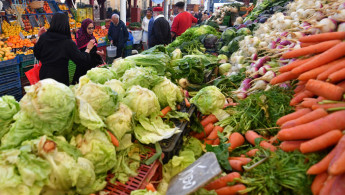As Ramadan approaches, Tunisia braces for worsening food shortage
With Ramadan approaching, Tunisians fear a worsening of the country's ongoing food shortage as the state struggles to fill supermarket shelves and control skyrocketing prices of essential goods.
"Ramadan used to be a month of celebration. Today, it's a stressful occasion for Tunisians. Will we be able to find and afford food? Only God knows," said Khalifa, a young Tunisian teacher.
The Muslim holy month of Ramadan — set to begin on Monday, 11 March, or Tuesday, 12 March, depending on the sighting of the new moon — is a religious and social celebration in the region usually accompanied by increased consumption.
The consumption rate during Ramadan increases by 34%, according to Tunisia's National Institute of Consumption (INC)
This year, the North African state is struggling to meet the food needs of its 12 million population. Milk, cereals, and red meat are the essential goods lacking at affordable prices in the Tunisian market.
Once dubbed 'Tounes El-Khadra' ("green Tunisia"), today, the North African nation is in its fourth year of drought, grappling with the worst water scarcity and agricultural crisis in years. According to the World Resources Institute, Tunisia is the 33rd most water-stressed country.
Alongside the intense drought and decreased agricultural crop yield, high inflation makes it more difficult to afford goods even when they are available on the market shelves.
In February, Tunisia's inflation slightly decreased to 7.5% from 7.8% in the previous month. However, this decline didn't lead to lower prices. Instead, it's expected to rise again in March and April with the Ramadan consumption craze.
In Tunisian markets, Tunisians substitute their need for lamb (45 TND equals US$14.5) with horse meat (14 TND equals US$4.50), a more affordable option in a country where the minimum wage is less than US$150.
Meanwhile, seafood has become a luxury in the Mediterranean country. "Now, Tunisians go to the fish market only to watch; they can't afford most things there," said Salma, a Tunisian woman and mother of two.
Like many Tunisians, Salma said she would have to cut off fish from her Ramadan recipes as seafood prices have peaked at over 80 TND (US$25).
Moreover, the Tunisian Organisation for Consumer Guidance anticipates another rise in vegetable and cereal prices during Ramadan as the religious celebration coincides with the agricultural inter-seasonal period.
According to Taoufik Al-Riyahi, president of the Tunisian Organisation for Consumer Guidance, "The daily cost of a typical Ramadan basket would surpass 50 dinars (US$16)."
President Kais Saied has accused 'known parties' of exacerbating the country's food shortage for the past two years. Consequently, the government's official Facebook pages have been sharing daily pictures of crackdowns on alleged "speculators and selfish hoarders" who withhold products from the markets to sell later at inflated prices.
Saied has also enacted a Decree-Law that will sentence those who hoarded state-subsidised products, such as cartels hoarding flour, to 10 to 30 years in prison.
The decree also prevents the spread of "misinformation about food shortage." Amnesty International decried Saied's law as sabotage of Tunisians' freedom of speech on the countries' struggles.
However, the government's crackdown has thus far failed to resolve the issue, which economists argue has little to do with hoarders and much to do with Saied's failure to negotiate an international bailout.
Economic experts say that the shortages, which have affected mostly subsidised products, are mainly caused by a crisis in public finances.
The IMF reached a staff-level funding agreement with Tunisia in 2022, but President Saied subsequently slammed its recommended reforms as "foreign diktats" that would impoverish Tunisians. Last October, Saied fired his economy and planning minister, one of the most vocal advocates of the rescue program.





 Follow the Middle East's top stories in English at The New Arab on Google News
Follow the Middle East's top stories in English at The New Arab on Google News


